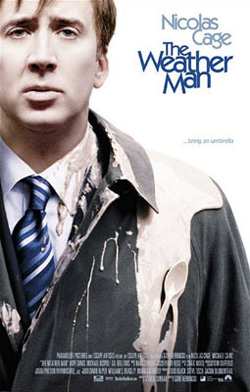 I sort of felt bad for Verbinski at this junket. The man took a short time away from the back-to-back productions of Pirates 2 and 3, which I keep hearing is totally chaotic (they don’t really have a script for 3 apparently), to promote The Weather Man here in L.A. a couple of months ago. Verbinski was notably quite tired, and as luck would have it, I was part of his very last roundtable group… the group I never wanna be a part of. It’s like when you’re at the office on a Friday and it’s 10 minutes to 5 o’clock. You just wanna get the hell outta there! But nevertheless, Verbinski was cordial, friendly, and sometimes even a tad snarky. I liked that.
I sort of felt bad for Verbinski at this junket. The man took a short time away from the back-to-back productions of Pirates 2 and 3, which I keep hearing is totally chaotic (they don’t really have a script for 3 apparently), to promote The Weather Man here in L.A. a couple of months ago. Verbinski was notably quite tired, and as luck would have it, I was part of his very last roundtable group… the group I never wanna be a part of. It’s like when you’re at the office on a Friday and it’s 10 minutes to 5 o’clock. You just wanna get the hell outta there! But nevertheless, Verbinski was cordial, friendly, and sometimes even a tad snarky. I liked that.
The Weather Man opens everywhere Friday, October 28th.
Q: Are you on shore leave right now?
Verbinski: Yeah. They let me off.
Q: So when was this shot?
Verbinski: It was shot between February and March of last year. Yeah. ’04.
Q: You were between movies?
Verbinski: Yeah, right between Pirates 2 and Pirates 3.
Q: How did you come to this?
Verbinski: How did I come to it? I really wanted to do a drama and it was a great script.
Q: Is this about the American dream?
Verbinski: Well, I guess that this is the new American way. This really isn’t the classic American dream necessarily, I think. I don’t think that that American dream exists anymore, the perfect family like The Brady Bunch. It’s the erosion of the American family that we’re dealing with here.
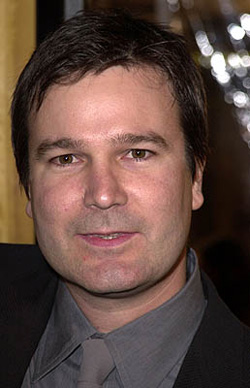 Q: When was the first time that you realized that life is unpredictable?
Q: When was the first time that you realized that life is unpredictable?
Verbinski: When did I first realize that? I don’t know, probably in kindergarten. I think that when I read the script it was obvious that this was the struggle of this man, against the elements – The Weather Man. It’s his battle against mediocrity and his attempt to hold his family together, but it’s too late.
Q: There is always some sort of weather element in the frame of the film and I’m wondering, how important was it to show that in terms of the storytelling?
Verbinski: Well, the weather is a character in the film and so is fast food, indeed, a character in the movie. And I think that these characters are plotting against Dave Spritz as he makes his journey. And I think that he naively thinks that if one thing had changed his life would be different, like if he would have remembered the tartar sauce. He is a shallow character who you want to smack and who you want to give a hug at the same time. He is a sound-bite. He has to sum up something very complicated which is the weather and package it and distill it down and present it and that process I think has contributed to the fact that he is trying to distill down his life and predict it and control it and he thinks that teaching his kid archery is going to solve the problem, but you have to be there everyday for your kid. You can’t just show up one day and try to fix it and he’s trying to double down and roll the dice one more time and put it all together and he’s not seeing the bigger picture and complexities. He’s not a meteorologist. He doesn’t understand. He’s not his father. He doesn’t understand how complicated those issues are.
Q: Can you talk about the casting of Nicholas? You mention that his character is someone you kinda want to smack and hug at the same time, but it takes someone that can draw that sort of response from an audience. How did you know he’d be able to fit that mold?
Verbinski: Well, we’re both forty years old and he read the script at the same time that I did. So when I finished it I was thinking of him and when I met him, and we’ve met before, but this is the first time that we said that this is the one, and he said, "I am this guy. I don’t have to act. This is me." He’s been through marriages. He goes out and people harass him publicly. He’s got father issues and he’s struggling like all of us against mediocrity in our lives. So, there was really no one else to play the part.
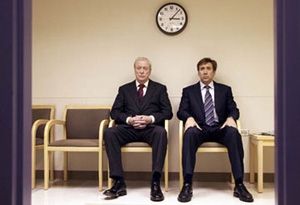 Q: And what about Michael Caine?
Q: And what about Michael Caine?
Verbinski: Well once you have Nic, you have to contrast that. This script required an Atticus Finch or Gregory Peck kind of unbelievable character, something impossible to live up to, and to me that’s Michael Caine. It’s rare that you get star struck when you meet a lot of actors, but Michael Caine did that for me. You want to touch him to make sure that he’s really there. [Laughs] And a lot of older actors would look at a director like myself and say, "You know, I was doing this when you were in diapers." And he really treated me like I was David Lean. He was really respectful. "Yes, sir. How would you like it different? I’ll try it again. That sounds good." He’s the kindest man and he has so much integrity and that character was written somewhat cold. Michael Caine can be cold, but he can never not be warm. And that was really important. He’s not in that many scenes and yet you feel his presence and you feel that it’s unattainable to live up to. That’s the blindness I think of the movie, that Dave Spritz, we all – I hope that people will see this in the movie – but we all want to be more. We want to be better lovers, better parents, better at our jobs, and yet at some point we have to face the music and stop trying to be something and realize who we are. There’s just an impossible gap between Robert Spritz and Dave Spritz. Robert is filet mignon and Dave is an Egg McMuffin. And there’s no way. He’s never going to get there. So what he can do hopefully is realize that he’s not going to get there and realize that his father isn’t expecting him to get there and come to terms with who he is.
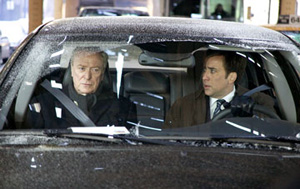 Q: Did the two of them work well together?
Q: Did the two of them work well together?
Verbinski: Yeah. We wanted a little bit of distance between them, but what’s nice about making this kind of movie is that you don’t have pirate ships or cannons or car chases or whatever, so you can actually spend time sitting right where we’re sitting now and read the pages and talk about the scene and it makes a difference. It really makes a difference if you can get the process out of the way and talk about acting and make it simple.
Q: A lot of people have wondered why you made this film, or rather this type of film. Do you have an opinion or any thoughts on the expectations there are of you as a director?
Verbinski: Well, I should apologize now. I’m not interested in myself as a brand. I’m not trying to build a body of work and I’m not trying to perfect a genre. I’m just trying to grow and learn and exercise different muscles and challenge myself. I like to do movies that I’m afraid that I can’t do because there’s something dangerous about that. In this business it’s going to go away tomorrow or someday. People will eventually go, "Whatever happened to that guy?" So you might as well go out doing something that you go, "Yeah, that’s okay. I left doing a movie that I really liked."
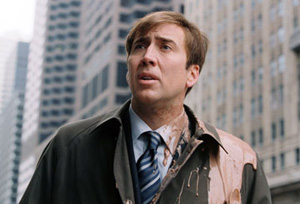 Q: Is there such a thing as a Gore Verbinski style your films?
Q: Is there such a thing as a Gore Verbinski style your films?
Verbinski: I try not to impose a style on the movie. I think that’s a really dangerous thing to do. I try to look at the movie and go, "What does this want to be?" Whether it’s a script or a pitch or an idea. "What does it want to be?" Style can be the absence of style.
Q: Well, maybe not style then, but perhaps a signature. Something that makes it your own.
Verbinski: I don’t know. I didn’t approach it like that.
Q: Was there a theme that you were looking to explore in the film?
Verbinski: Well, I think that it’s always good dramatically to have a character who is struggling against something or who is blind, who believes something or can’t see – there’s an obstacle internally. I think that those are just more powerful characters. So I guess using the process of working on the script we talked about all of those things, and so somehow in that process we work on that. But that’s more craft. It’s not like there’s an agenda. It’s just craft. So you would probably better answering that question.
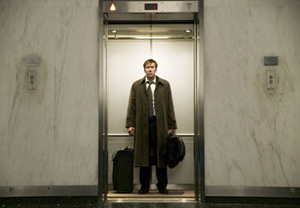 Q: Can you talk a bit about Pirates? How hard was it to get two more sequel scripts that were just as good as the first one?
Q: Can you talk a bit about Pirates? How hard was it to get two more sequel scripts that were just as good as the first one?
Verbinski: We don’t have those scripts yet. [Laughs] We’re just making the movie. No. We actually have a pretty good second script and the third script is still on the operating table. And we’re in triage constantly, everyday. I don’t recommend making two movies at once. I think that we’re going to get there, but it’s just madness. You’re like building ships and the ships aren’t ready and you have four hundred extras. There’s a lot of fun and I think that the second movie is strong and clever and has a lot going on. The third movie we’re still working on.
Q: So you’re not doing like Lord of the Rings and shooting them both at the same time?
Verbinski: No. We are. We are. We’re shooting scenes in the third movie without even knowing what the hell we’re doing. [Laughs]
Q: Will Keith Richards be in it?
Verbinski: We hope so. We’re trying to work out his dates. We all want it to work, but there’s his tour dates, his lawyers, etc.
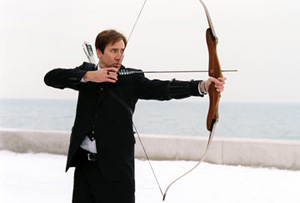 Q: How much of the magic was Johnny Depp’s performance holding it all together?
Q: How much of the magic was Johnny Depp’s performance holding it all together?
Verbinski: It’s tricky. You can’t just phone that in. We actually have a story that’s challenging and compelling and dangerous, and he’s still the character that gets to weave his way through that story and affect everyone else with his own agenda. But you don’t want to make the mistake of going, "Well, they loved Johnny Depp. Put him in every scene!" You’d then kind of wear that out. You need a very unique take.
Q: So he’s still a supporting actor in these movies?
Verbinski: Supporting actor? [Laughs] No, I think that he’s carrying the movie.
Q: Technically, have you wrapped 2 and are doing 3 now?
Verbinski: No. I’m a quarter of the way through Pirates 3 and three quarters of the way through Pirates 2. It’s madness.
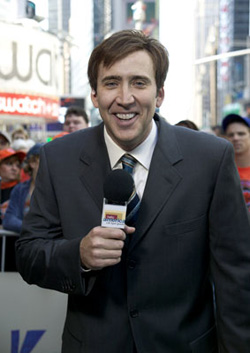 Q: Did you talk to Bob Zemeckis about shooting back-to-back films?
Q: Did you talk to Bob Zemeckis about shooting back-to-back films?
Verbinski: Yeah. I also talked to Peter Jackson.
Q: What was his advice?
Verbinski: "Re-shoots."
Q: When is 2 supposed to open?
Verbinski: July 7th.
Q: Are you going to follow Jackson’s advice?
Verbinski: We don’t have time for re-shoots! [Laughs]
Q: Is it a lot of pressure doing this and did you know what you had on the first film?
Verbinski: Well, I mean, I knew we had a fun movie that was going to make it’s money back, but the exponential factor was Johnny’s performance and that character which they were so nervous about.
Q: You mentioned that of older actors like Michael Caine, some of them tend to hold that idea that they’ve been doing this since you were in diapers. Have you had that experience before with an older actor?
Verbinski: Oh yeah. Gene Hackman chewed my head off. He’s a crotchety old guy. [Laughs] He’s great.
Q: Before you make a movie with an actor do you try and make sure that they don’t have big egos and so forth?
Verbinski: Well, it depends. Some of them are worth it. Everyone has a different process and sometimes you need that solo violinist and it comes with a headache and you take the headache because you need the solo. It’s completely project dependent. I don’t want to make a bad movie just because I want to work with nice people, but I don’t want to work with assholes and not get something great out of them either.
 Q: How hard was it to find the kids for this film? They came off so real.
Q: How hard was it to find the kids for this film? They came off so real.
Verbinski: Yeah, Nicholas Hoult was in About a Boy and he grew like three feet. He’s fantastic. And Gemmenne de la Peña we discovered and she’s just really, really strong and fantastic. They’re great because a lot of times with children you have to direct them externally. You have to talk to them about how to make their face because they’re not in tune with their instrument and they don’t know how to act emotionally and not put it on the outside where with those two I could direct them the same way that I direct any other actors.
Q: What would be the moral of The Weather Man?
Verbinski: What would be the moral? The moral is that I think there are great people and then there are the rest of us and I think that the rest of us are divided into two groups. There is the group that recognizes, that comes to terms with the fact that we’ll never be Albert Einstein and then there’s the other group that keeps trying to be something that they’re not. I personally think that there is more misery in the people who never comes to terms with it. The people who come in at some point and say, "Okay. This is who I am. I’m not going to be all those other things." They then go on to actually start living.
Q: I feel sorry for Nicholas who says that he really felt that he was this person.
Verbinski: I think that he just has a lot of personal experiences to draw upon, to bring to this performance. I don’t think that Dave Spritz is shallow. I think that Dave Spritz is trying to live up to something that he’ll never be. That’s not so much the thing that Nic and I were talking about. We weren’t talking about that. He has experiences, though. He gets stalked by people in cars who go, "Hey, my girlfriend thinks you’re cute. I think that you’re an asshole." It’s like, "Okay. I’m glad she thinks I’m cute and I’m glad you think I’m an asshole." He simply deals with it.